Official Motto: "By Grace of God, Basileus of Dorwinion"
Unofficial Motto (traditional): "Vive la Dorwinion!"
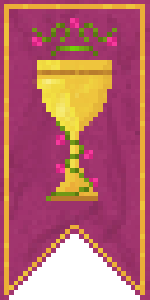
First banner of the Empire of Dorwinion
Dorwinion, officially the Basileia of Dorwinion, otherwise known as Land of the Young, is a Kingdom by the Sea of Rhûn. A nation of plantation-owners, vintners and merchants, the Dorwinine folk have long been known for their fine, heady wine and their notorious longevity. Dorwinion is divided into two distinct races; a southern variant of northmen, related to their Dalish neighbours to the north, and the Avari and Sindar elves, who have coexisted in relative peace for the realm's long history. Dorwinion's economy is largely agricultural, but its geographical position also allows it to act as a viable middleman between the realms of Gondor, Dale and Rhudel; these advantages have allowed Dorwinion to flourish perpetually even in the face of great adversities happening elsewhere. Dorwinion is ruled by Basileus Thalawestor I of the House of Bladorthin, a descendant of King Bladorthin of legend.
Administration[]
Dorwinion is ruled by the Basileus, while military governors known as Strategos(Plural: Strategoi) preside over his many provinces. As a efficiently-run autocracy, the state requires a well-structured and defined hierarchy to function.
Basileus (Fem: Basilinna) - The Basileus (King/Emperor) holds executive control over the civil elements of the Dorwinine government and presides over the Strategoi. They are the monarchs of Dorwinion, exercising (nominally) divine right as rulers.
Strategos - The Strategos (General) is a military governor, each controlling a Thema or group of Provinces (ie. large area) of Dorwinion. They are directly appointed by the Basileus and exercise full executive control over their territories - unless the Basileus supersedes their commands, they reign supreme in their administrative divisions.
Exarch - The Exarch is similar to the Strategos in function. Only one Exarch is known, that being the Exarch Nikephoros IV Laskaris.
Archigos - The Archigos (Commander) is a military governor, each controlling a Periochì (ie. province). They have to answer about their work with the Stratigoi and the Basileus, and the Basileus can make or replace them at any time.
Grandmaster - Effective leader of the Bladorthin Order's chapters, he trains and readies this military elite and the whole Tsolia.
Current(Third Age) History[]
Thalawestor I Bladorthin, Basileus of the Dorwinhrim[]
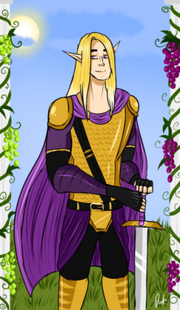
Lorven as a captain of the Dorwinhrim.
The Basileia of Dorwinion, as a centralised state, was founded in TA 2951, in the wake of the decisive Battle of the Golden Ford, which saw the complete routing of easterling forces across the Golden Ford at the hands of Dorwinine forces and their brave allies. The Dorwinine commander-in-chief during the battle was Lorven Bladorthin, a prominent noble and candidate for the Dorwinine throne - with much of the military might of Dorwinion concentrated under him after the battle, he moved quickly to seize power and peacefully gained the throne by TA 2952, thus becoming the first Basileus of Dorwinion since the days of Bladorthin and assuming the regnal title Thalawestor.
Upon assuming his new position as Basileus of Dorwinion, Thalawestor began to consult members of the Strategoi - military generals who ruled Dorwinion - about their next course of action. In addition, he employed the services of Eugène Engoria, a minor lord of the western marches and a rising architect of the Vintner Court, granting him the position of Chief Architect and delegating the monumental task of claiming southern Rhovanion for Dorwinion to him.
Fourth and Fifth Age Continuity History[]
Dorwinine Golden Age[]
Emperor Rainbow_Tree the Old
The First Emperor of Dorwinion; he unified the men and elves of Dorwinion nearly two millenia after the fall of the Bladorthine Dynasty. Additionally, he colonised Dol Guldur and formed a puppet government there to watch over the expanses of Rhovanion.
Emperor Duinor the Golden
Styled as: Duinor Bladorthin the Second, Emperor of the Dorwinhrim.
Emperor Duinor succeeded him as the second Emperor of Dorwinion, seizing power in a coup d' etat. Before his rise to power, Duinor used to be a bartender serving in the crossroads of the Golden Ford. Thus, he understood the needs of his people and his empire prospered, earning him the moniker of "The Golden." His ministers, including his chief advisor Arginon II Engoria, were capable and offered plentiful insight to the Empire's issues and merits. He died tragically under the hands of the elves in Tol Edhil, sparking a deep resentment between the Avarim and the Northmen of Dorwinion for centuries to come. In retrospect, his tenure as emperor is now lauded as a Golden Age of Dorwinion, which many scholars, ministers and even future monarchs and emperors looked up to as an example of the ideal Dorwinion.
Archon-Regent Arginon II Engoria
Styled as: Arginon Engoria the Second, Lord Protector of Dorwinion, Prince of Fillias, Grand Duke of Samos.
Arginon II served as the chief advisor, or Archon, of Duinor the Golden. When Duinor was slain along with most of his most valued nobility, Arginon got to work mending the cracks in the state - the Avarim were persecuted against for their "crimes against the Northmen", and a rapid military buildup followed. Before long, however, his aggressive policies led to his downfall when the country began dissolving into pieces, the rift between man and elf growing yet wider throughout his reign. He called in the armies of Gondor to seize control and abdicated a couple months later. Up to this day, the Engorians are remembered by the men of Dorwinion as fervent and heroic nationalists, while the elves view them with bitter resentment.
Dorwinion as a Gondorian Province[]
Stewardship of Cirion
Styled as: Cirion, Lord Protector of Dorwinion.
Not much is known of the Steward, other than that he served Gondor.
The 'Quiet Years' (FO 342 - 424)[]
Basileus Arginon III 'Laurenor'/Casmir Engoria (FO 342 - 364)
Styled as, respectively: Arginon Engoria the Third, King of Dorwinion, Prince of Fillias/Casmir Engoria, King of Dorwinion, Prince of Fillias.
The Engorians returned to Dorwinion in the year 342 of the Fourth Age. High King Cassimir Engoria had just fled Arnor following his humiliating defeat at the hands of Gondor, heading back to his ancestral homeland - there, Cassimir reestablished control in Dorwinion and seceded from Gondor following a treaty with the Forodhrim Arduin. He disappeared soon afterwards and Arginon III Engoria, his brother, took the throne and ruled for twenty years. He abdicated in the year 364 of the Fourth Age.
Basileus Azalos & Ostarion (FO 364 - ?)
Styled as: Azalos, King of Dorwinion/Ostarion, King of Dorwinion.
Azalos was not an Engorian, but being a trusted confidant of Cassimir in Arnor he was appointed the next Basileus. He ruled for a short period of time with the co-Basileus, Ostarion, before Brasus ascended to the throne.
Basileus Brasus (? - ca FO 395)
Styled as: Brasus, King of Dorwinion.
Brasus was a Dunlending, and thus many in Dorwinion viewed him as illegitimate. However, his policies were fair and the people eventually were calmed. Under his rule, records were seldom written and the annals were left neglected...thus, we do not know much about his reign and policies.
The Aenlid Dynasty (FO 424 - VA 112)[]
Basileus Tostor "The Ignorant" (FO 424 - 471)
Styled as: Tostor Aenlas, King of Dorwinion, Prince of Fillias, Prince of Vinburg.
Tostor ascended to the throne in the year 424 of the Fourth Age, after a long and grueling war to reunite the regions once more, thirty years after the crumbling of the Middle Kingdom of Dorwinion under Brasus. He was known as "The Ignorant", as he was completely oblivious to the painstaking deeds of his subordinates, offending or exiling many of them. It was at this time that a new power rose in the east - the Great Rhunic Empire, led by the Wainrider Shahanshah Étila Endereson. Archon Anaris Engoria, daughter of Cassimir, was exiled in the year 430 of the Fourth Age on charges of collaborating with the Rhunic Empire, and civil unrest broke out soon after. Dorwinion began to crumble, and Tostor, in a panic, fell into deep depression and illness. He laid bedridden for a long time until his death in the year 471 of the Fourth Age, twenty years after the Bragolmor.
Basilinnate of Langien Aenlas - Coexisted as a regency for the occupied Basileus until Tostor's death (FO 471 - VA 89)
Styled as: Langien Aenlas, Queen of Dorwinion.
Langien Aenlas was the wife of the Basileus Tostor, and upon his decline in health she seized the reins of power. Appointing many loyal douxes into power - including Doux Corrine - she managed to stabilise the nation and restore public order. She disappeared in the year 89 of the Fifth Age, reported to have been looking for someone(Some speculate it may be her deceased husband, Tostor)
Basilinna Elbereth Aenlas (VA 103 - 112)
Styled as: Elbereth Aenlas, Queen of Dorwinion, Marquise of Celenium, Duchess of Dalaran, Marquise of Merakai, Princess of Vinburg.
Elbereth Aenlas was the hereditary heir to the throne, being the daughter of Langien and Tostor. She fostered friendly terms with her subjects, including Archon Arenelyya Dagothar, Doux Corrine, Grandmaster Filverel and many others. Under her reign, Dorwinion's first territorial expansion began; the wild lands up north in Celenium along with the assorted territories of former Rhovanion west of the River Langien were annexed and transformed into aristocratic estates under Elbereth's nominal supervision. Many speculated her reign may yet be another Golden Age for the nation of Dorwinion, but civil strife unfortunately took hold of the realm; rising elements of a movement known as Revivalism eventually grew strong enough to supplant the Basilinna's rule, and the lords of the land refused to lend aid to the Royalist cause. To make matters worse, foreign powers began backing the Revivalists against the polarising and controversial Aenlid Dynasty - the influx of supplies and materiel from nearby Rhun and the Woodland Realm allowed the Revivalists to turn from a mere rebellion into a formidable rival of the Basilinna. The Dorwinine Civil War had begun in earnest.
The Dorwinine Civil War (VA 107 - 112)[]
Archon-Regent Arenelyya Engoria-Dagothar
Styled as: Arenelyya Engoria-Dagothar, Lord Protector of the Dorwinhrim, Princess of Arenelle, Marquise of Laraquesky.
After the Revivalists began involving themselves militarily in the matters of the realm, a provisional capital at Arenelle was set up, rallying loyalist forces under the self-proclaimed "Archon-Regent" Arenelyya Dagothar-Engoria. After gathering a significant number of western lords from the Archonate of Fillias, and more soldiers from the Exarchates of Wilderland, her host of thirty-four hundred men marched against the Revivalist leader, Basil III, in his city of Gwiniopolis.
She gave a list of demands in the name of peace and order in Dorwinion:
1. She will be granted the official title of Grand Princess/Megas Archon.
2. Basil III will be afforded the title of Regent, giving him universal powers.
3. Arenelyya will remain an advisor of the court.
4. Elbereth will remain as the Basilinna, but hold no power.

Archon-Regent Arenelyya.
After a refusal by the Revivalist garrison, Arenelyya began her attack on the city; however, a mixture of ingenuity on the part of the Revivalists and disloyal lords in the Archonate army led to a bitter and decisive defeat for the Archon. The Archon-Regent officially surrendered her remaining forces in the road outside of Gwiniopolis; Basil III imprisoned her in squalid conditions before yet another pretender(and outspoken ally of the Revivalists), the former elven Basileus Ostarion, broke her out for unspecified reasons. She has since disappeared from history, and her whereabouts and status are unknown.
The Loyalist Party
The disappearance of the Archon-Regent led to an increasingly fragile state of affairs for the loyalist government at Dalaran - the Basilinna remained in control of much of the country, but with the Fillians completely deprived of military strength after the destructive battle of Gwiniopolis, she could only retain military influence in the south of the country. Gwiniopolis was not far from the Vintner Court, and as a result many battles were fought between the Loyalists and Revivalists in the region, both sides galvanised by foreign aid. The Loyalists were supported by their immediate elven allies to the north, but otherwise received little endorsement outside the realm. The Loyalist Party Elbereth headed, supported by many of the realm's metropolitan Douxes, claimed to fight for the integrity of the realm and the continuation of the Aenlid Dynasty. The speech she gave after the imprisonment and presumed death of the Archon-Regent, supposedly issued in Dalaran, has been recorded well in the annals:
"I thank all of those who have helped Dorwinion in these trying times, but we shall not give up and we will push forward forever. I wish the new members of the Doux Council and the new Archon the best of luck within their new roles within the Empire of Dorwinion. I also will deeply miss my friend and advisor, Arenelyya. She has always been there for me, and it's sad to see her go. Yavanna bless Dorwinion, and her people."

Basil III.
The Revivalist Party
Styled as: Basil the Third, King of Dorwinion, Prince of Arenelle, Prince of Vinburg, Duke of Dalaran, Duke of Gwiniopolis, Marquis of Merakai, Marquis of Laraquesky, Marquis of Celenium.
The revivalist movement was led by the ambitious Basil III "Easterling-Slayer", who styled himself as the Basileus of Dorwinion. The battle at Gwiniopolis only helped to uplift the Revivalists, and their frequent battles against the Loyalists caused great strife and woe for their enemies in Dalaran. They were heavily supported outside the realm, with the greater part of Middle-Earth's many entities supporting them in the civil war - despite this, they took years to finally take control of the country, and only at the death of Elbereth Aenlas(therefore ending the Aenlid Dynasty and making Basil III the only legitimate claimant). The Revivalists claimed to fight for the old ways of Dorwinion and for an orthodox interpretation of Dorwinion's ancient culture, a creed largely endorsed by the northmen of Dorwinion, most prominently those from the old Engorian faction in the years following the death of Duinor. Elbereth Aenlas was killed whilst supervising a building project; Basil III soon seized the reins of power and the remaining pockets of Loyalist resistance surrendered without a fight, officially ending the Dorwinine civil war. Basil III was a surprisingly moderate king outside of war - he ruled with wisdom and care, allowing Dorwinion to prosper under his supervision. The years that followed would be known as the Revivalist Hegemony, and were marked by relative stability, though much controversy would be engendered by the later kings' decision to side with Mordor.
The Revivalist Hegemony (VA 112 - ca 159)[]
Basileus Alexios I The Kinky (ca VA 120 - 129) & Archibados I Heraclias the Good (VA 129 - ca 145)
Alexios the First, King of Dorwinion, Prince of Arenelle, Prince of Vinburg, Duke of Dalaran, Duke of Gwiniopolis, Marquis of Merakai, Marquis of Laraquesky, Marquis of Celenium, Marquis of Pharos Quarry/Archibados Heraclias, King of Dorwinion, Prince of Arenelle, Prince of Vinburg, Duke of Gwiniopolis, Duke of Throniopolis, Duke of Dalaran, Marquis of Merakai, Marquis of Laraquesky, Marquis of Celenium, Marquis of Pharos Quarry.
Basil III died not long after his ascension to the throne, and left the throne to his heir, Alexios I, known in contemporary records as Alexios I The Kinky, Basileus of the Realm of Dorwinion, by the Grace of Yavanna. He ordered great public works to be built in Gwiniopolis and Thriniopolis during the years of his reign, and brought the realm under the influence of Mordor, participating in its wars. However, his policies echoed that of his forefather - elves were marginalised, and laws were made that prevented them from taking up political roles in the realm. He was killed at a young age after contracting a sexually contracted illness, purportedly spread only by the intercourse of anal fluids. Succeeding him was the Basileus Archibados I, of the house of Heraclias, who ruled as co-Basileus during Alexios' reign. Archibados reversed certain policies enacted by his predecessor, the most notable being the introduction of elven nobility into elections, giving them greater political leverage and reconciling the two races of Dorwinine society. He was a diplomatic king that ruled Dorwinion wisely for many years before the Grandmaster of the Order of Bladorthin, Cerendir, staged a coup d'etat against Archibados and declared himself Basileus of Dorwinion.
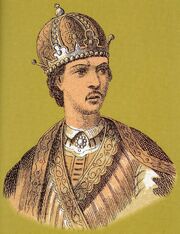
Basileus Cerendir Komnenid.
Basileus Cerendir Komnenid (ca VA 145 - 159)
Styled as: Cerendir Komnenid, King of Dorwinion, Prince of Arenelle, Prince of Vinburg, Duke of Gwiniopolis, Duke of Throniopolis, Duke of Dalaran, Duke of Cezaria, Marquis of Merakai, Marquis of Laraquesky, Marquis of Celenium, Marquis of Pharos Quarry.
Cerendir was the first elven Basileus since the beginning of the Revivalist Hegemony, and took power after a coup against Archibados the Good. He, like Archibados, was a diplomatic king, and made Dorwinion enter the CoR early on in his reign. He was known to be a wise, venerable king, a master of proverbs, poems and idioms; an accomplished writer, we know much about his reign, including his achievements in building the city of Cezaria, the management of the realm's standing amongst its neighbours, and in fostering friendly relations with the Kingdom of Dale. He, running contrary to almost all the Dorwinine monarchs before him, chose to abdicate voluntarily and did not get ousted by force or popular opinion, leaving his throne to Grandmaster Quelanor of the Order of Bladorthin. His reign is remembered fondly, and especially so in contemporary historiography, for his reign marked the end of the Revivalists and began a new era known only as Dezintegrarea, or The Decay; a time we still live through today.
Days of the Directorate and 'Dezintegrarea' (The Decay, VA 159-187)[]
Archon-Regent Quelanor 'The Houseless'
Styled as: Quelanor, Lord Protector of Dorwinion, Prince of Odessa.
Quelanor was the first figure to preside over Dorwinion after the end of the Revivalist Hegemony. During his reign, the realm of Dorwinion first saw signs of decay; as a result, most historians today view his time as Archon-Regent as the beginning of Dezintegrarea; a period of contracted, steady decline as the gaps widened between the Mitropol and the Frontierlands, with the military no longer being able to retain control over Dorwinion's provinces. Eventually, the uneventful reign of Quelanor ended when he decided to retire, once again becoming the Exarch of Odessa.
The Directorate of the Realm of Dorwinion
Styled as: The Council of Directors of the State of Dorwinion.
The abdication of Quelanor caused yet another power vacuum in Dorwinion, but thankfully the administrative structures of the realm held fast, preventing another civil war; in a bold move, the Council of Douxes(Upper House) merged with the Duma(Lower House) to form a new security council known as The Directorate, pledged to manage Dorwinion during times of anarchy. However, the fragile order they had carefully cultivated to prevent anarchy made it hard to manage the provinces and exarchates of Dorwinion, and many decided to break away from the Directorate's influence. Today, power is divided between several major factions in Dorwinion; the Directorate based in the Vintner Court, controlling much of the Păduri and central Mitropol; the Duchy of Arenelle, controlling the western Mitropol and the Marchiză, and the Exarchate of Odessa, controlling a vast swath of colonial territory to the far west beyond the River Langien.
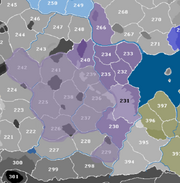
The territorial expansion of Dorwinion under Arenelyya's reign; Dorwinion effectively doubled in size over the course of five years.
The Reign of Arenelyya (VA 187-193)[]
Strategos Arenelyya and the Council of the Strategoi
Styled as: Arenelyya Engoria-Dagothar, Master of the Provisional Committee of the State of Dorwinion.
The former Archon-Regent, Arenelyya Arginovna Engoria-Dagothar, returned in 187; initially unprepared for a coup whatsoever, she soon received the full endorsement of Doux Konstantinos, the grandson of Arenelyya's old friend, Doux Septimos, whose domain encompassed the only(and highly lucrative) route from the east. Pledging an army of a thousand men to Arenelyya, Konstantinos marched with her to the Vintner Court, where she was joined by the Exarch of Odessa - the former regent Quelanor - and Alatar, a well-regarded blue wizard. In the name of peace and stability, the Directorate nobly decided to step down by their own will, relinquishing power to Arenelyya, who declared herself and her two allies the Strategoi of Dorwinion, and ordered the council dissolved and its Exarches and Douxes reduced to gentry. This new system worked well in ensuring her tight grip over the realm in years to come, along with encouraging ties between the military and civilian leadership that would aid Dorwinion in its ambitions abroad.
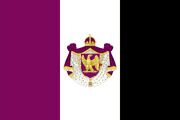
The flag of Arenelyya's Second Empire(Note the crown)
In 188, refugees from the far north made their way to the city of Veronae, where they revolted against the tyrannical leadership present there - this heavily mirrored the previous Bardhaven Revolution of 187, which involved the defenestration and ultimate demise of the Earl of Lordsport and sparked the beginning of a short but brutal reunification war undertaken by the revolutionaries. Likewise, the city of Veronae soon came after revolutionary control, and Arenelyya began negotiations with them soon after gaining power; the leader of the Veronae Revolutionaries, Cirion, was granted the position of Strategos of the Theme of Albamunte. In the same year, another of the Istari, Mithrandir, decided to join the realm and was appointed to the post of Strategos of the Theme of Paduri - a position that would afford him proximity to his old estates.
Intervention in the Woodland Realm
In the year 188 of the Fifth Age, Emperor Neithoron - the ruler of the Woodland Realm - released an edict containing chauvinistic and vile laws favouring the elves(particularly the Silvan Elves, in this case) over the other peoples of the Commonwealth such as Dale and Dorwinion. Immense backlash followed, with massed outrage sparking in the two kingdoms as the men and women of the Commonwealth realised their rights were in danger. After a short period of mobilisation and coordination with the Dalish to the north, Strategos Arenelyya addressed the Dorwinhrim, ensuring that their rights shall be protected and for 'imminent retribution' to be delivered to the Silvans in Greenwood. What followed is known as the Rhovanine Intervention in the Woodland Realm; the combined military might of Dale and Dorwinion, with the latter having grown militarily strong in a year's time, forced Neithoron to abdicate and flee in exile to the Iron Hills. The transition was a bloody one - when the coalition army reached Thranduil's Halls and the surrounding area, the Dorwinhrim responded with great brutality, massacring great amounts of Silvan collaborationists, women and children included. A Barding puppet was established - a boy named Erick Barding, and a new constitution was written with the supervision of Prior Forodred from Dale and Strategos Arenelyya from Dorwinion. As such, the Intervention could be seen as a resounding success - all the objectives of the expedition were achieved, and Dorwinion could continue to thrive in peace. This, however, did not signal the end of the realm's troubles - up north in Dale, Illahvatarist insurgents had established a de facto independent state in Obrona-Eastmarch, and the former Emperor Neithoron plots to regain his throne. To make things worse, growing tensions between the militarily and economically powerful Dorwinine state and the reinvigorated Barding government of the Woodland Realm have threatened the integrity of a union in Rhovanion, making it difficult to predict what the future may bring.
The Events of 188-189 VA
A tenuous peace ensued after the summer of 188, in which Dorwinion faced no other external or internal crises - however, to the north, the Illahvatarists continue to plague the Dalish who have been unable to react accordingly; the situation had become so dire that the Illahvatarists, spearheaded by the Al-Kazeem Brigades, established the Independent Illahvatarist State of Dale(IISD) in late 188. Rushing to the northern frontier-town of Arish, Arenelyya closed up the area, now dubbed the Mitropol-Arish, and made preparations to intervene in the insurgency which now threatened the borders of Dorwinion. Cooperating with a newly established and surprisingly effective paramilitary force known as the Obrona Liberation Army(OLA), and with the advent of particularly devastating gunpowder weaponry, the combined Dalish-Dorwinine force managed to slowly push the insurgents back. The Dorwinhrim would once again see action on the Celduin in the winter of 188 when they killed a small boatful of sailors ferrying cannonry up the Celduin - while a minor issue when compared to the greater geopolitical actions taking place around Rhovanion, it further eroded the relationship between the Barding Dynasty in Greenwood(which Arenelyya had helped put into power) and the Dorwinhrim leadership.
Towards the spring of 189, the cities of South Ghamiyah, Al-Jarut and Al-Fataq eventually fell to the coalition forces, provoking a peace talk that resulted in a semi-autonomous region being formed around Al-Jarut. Anaris Engoria, the former Archon of Dorwinion and the founder of Illahvatarism, was charged with terrorism and sentenced to twenty years of correctional detention in the Bardhaven prison alongside several IISD commanders.
The Constitutional Crisis of 189
Despite the relative stability of the Commonwealth of Rhovanion, its internal structure was wracked by civil strife and disagreements over the place of each state within the union. Neithoron's legacy had, in a way, remained; an imperial structure still stood, with the Emperor of the Woodland Realm at the helm(albeit with limited powers), something that many in Dorwinion and Dale viewed as unnecessary and humiliating. Worse yet was the abrasion present between the Barding line, who had assumed the role of the Imperial House, and the Dalish Republic who viewed their existence as being an insult to republican institutions and the Dorwinhrim who saw the Bardings as a foreign and unsympathetic dynasty unsuited for rule over all of Rhovanion. After a heated confrontation between Basilinna Arenelyya and Prior Forodred against the Barding Regent, Valdemar Barding, tensions were at an all-time high. In the winter of 189, events finally came to a head as Emperor Valdemar signed the newly written Constitution of the Commonwealth of Rhovanion without consulting the leaders of the Commonwealth. Enraged, the Prior Forodred and Basilinna Arenelyya prepared to launch yet another armed intervention to overthrow the Emperor; however, the Emperor proved adequately wise and repealed the Constitution immediately, allowing the two to make fair amendments to the Constitution without the use of armed force. The Constitution of the Commonwealth of Rhovanion was thus released, with the consent of all parties involved, in the spring of 190, and relations between the three constituent powers were becalmed...for the moment.
The Schism of Dorwinion (VA 191-199)[]

Arenelyya as Empress of Dorwinion.
Empress Arenelyya Engoria-Dagothar "Hakkonos"
Styled as: Arenelyya Hakkonos Engoria-Dagothar, by the grace of Javane, Illuvatar and the dieties of Arda; Empress of the Dorwinhrim, Queen of all Transrhovanion, Princess of the Mitropol, Princess of Arenelle, Duchess of Paduri, Duchess of Albamunte, Duchess of Arish, Duchess of Logarth, Marquise of Szepriveren, Marquise of Verdebine, Marquise of Albaserica, Marquise of Raubastru, Sovereign of the Elves and Men of Dorwinion.
In open opposition with the new imperial rule, and expecially due to the attempts of centralization operated by the Throne of Rhovanion, Basilinna Arenelyya declared herself Empress of Dorwinion, formalising the period already known as Revitalisation, or Second Empire. Tensions between the Emperor of Greenwood and the Empress of Dorwinion would simmer to new highs after VA 191, with drastic military and economic buildup in Dorwinion becoming the new norm. Under the Second Empire, Arenelyya consolidated most of the recently-acquired border regions, formally annexing them into the Empire of Dorwinion and enacting strict assimilation laws to 'metropolitanise' the populace. In addition, a new national anthem and flag were made during this time to signify Arenelyya as the ruler of a new Dorwinion. For three years, this would go on swimmingly, with the country rising to new heights and becoming increasingly dominant in the council-rooms of the Free Folk; Dorwinion stood at the zenith of its power, possessing the largest population, economy and army north of the White Mountains, surpassing even the Bladorthines and Aenlids in power and glory.
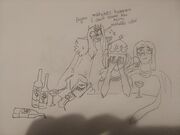
A satirist depicts Arenelyya as an alcoholic drowning her sorrows away.
The Rhudel Crisis of 192-193
In VA 192, Empress Arenelyya, attempting to exploit an apparent weakness of the Mordor sphere of influence and the fragmentation of its power bloc, declared war on Rhudel. The answer was immediate: counter-declarations, compounded by heavy political pressure, forced Arenelyya to concede much to the forces of evil with the treat of invasion on her doorstep. Folk tales abound from this time of many difficult negotiations between the Witchking and Arenelyya in Carn Dum; up to this day, not much is known about what had transpired in Carn Dum, and the former Empress remains unwilling to state anything regarding the matter. The Empress' humiliation saved Dorwinion, rendering it a fully independent state in its own right, but left her shaken and psychologically stressed. Ultimately, she abdicated the next year in favour of Quelanor, that had already been Interim-Basileus at the beginning of the Dezintegrarea, and left for the east (rumours initially claimed her demise, but later and more accurate sources confirmed that she lived far in Rhun with the former Prior of Dale, Forodréd Sigurdrsson). In a most macabre fashion, the anthem of Dorwinion - Departing for the[Golden] Ford - became exceptionally apt.
The events of 194-199
After the Rhudel Crisis, the Dorwinine state rapidly disintegrated. With the abdication of Empress Arenelyya in the winter of 193, the Dorwinine military effectively collapsed overnight - key generals and advisors amongst both the regular corps and the Istari retired en masse in protest of the circumstances, with many outright leaving the country. Arenelyya and Forodréd's departure left little in opposition to Valdemar Barding, save for the provisional regent of Dale and Veronae, Cirion Erindson: the Emperor of Rhovanion gradually removed, piece by piece, all the democratic rights of the citizens, and centralized the power in his hands - bringing the Commonwealth back to its original form under Neithoron. In the meantime, the Empire of Dorwinion suffered from civil instability due to the inaction of the Quelanor Administration, seen as too submissive to the Bardings as opposed to the hardline approach of the Empress Arenelyya. The Nika! protest, where numerous citizens assaulted the police displayed in front of the Vintner Court, although unsuccessfully, was the most significant organised revolt in Dorwinine history. In the meantime, the supposed 'martyrdom' of Arenelyya began to appear as a key concept in Dorwinine folk beliefs.
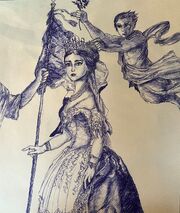
St. Empress Arenelyya in canonised regalia.
The Hakkonopouloi-Engorians dynasty (VA 200 - present)[]
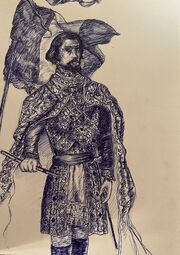
Emperor Constantine, age 20, in the Imperial Regalia of Dorwinion.
Basileus Constantine I Porphyrogenitos
Constantine Hakkonos Engoria-Dagothar Porphyrogenitos, by the grace of Illuvatar, Emperor of the Dorwinhrim, King of all Transrhovanion, Prince of Arenelle, Prince of the Mitropol, Duke of Paduri, Duke of Albamunte, Duke of Arish, Duke of Logarth, Marquis of Szepriveren, Marquis of Verdebine, Marquis of Albaserica, Marquis of Raubastru, Sovereign of the Elves and Men of Dorwinion.
In VA 200, the efforts of the Patriarch came to an end, as he managed to find Empress Arenelyya and her husband Forodréd in Rhun. Although he begged her, the queen refused to come back, for the events of Angmar had left her too shaken, and because the new attitude towards her may have turned into a fearsome religious fanatism. Despite that, due to her sense of duty towards her homeland, she sent her son Constantine to Dorwinion, to rule formally until he could properly exercise power. Constantine, firstborn of Arenelyya - alongside his twin sister Anna - was crowned Basileus as Constantinos I "Porphyrogenitos" Hakkonopoulos-Engorias the 1st January of VA 201. Few months later, the royal cabinet signed a confirmation of the peace treaty with Rhudel, officially named Act of Neutrality, that was meant to bring the two Nations on the Sea of Rhun into mutual tolerance and cooperation. Meanwhile, despite the young age and thanks to the support of the clergy and of the people, he managed to give dorwinion three Acts of "Democratisation, Defeudalisation, Demoticisation", a summa of laws where a more democratic and centralised administration was introduced, the army was reorganised and the court speech was forced into becoming more similar to the language spoken by the common people, and the public instruction of Dorwinion was made more modern and efficient to produce a capable ruling class for the future. More particularly, the demotic dorwinine was made the official language, and a parliament (the Voulì) was introduced, in charge of proposing laws and electing the Prime Minister (or Prothypourgos). The Basileus, though, kept the right of removing the Prime Minister and temporarily disbanding the Voulì. The land was reorganised in Themata and Perioches, ruled by Stratigoi and Archigoi chosen by the Basileus himself.
Members:[]
- Basileus Constantine (caranthir00)
- Prothypourgos Hagen (HagenOfBohemia)
- Stratigos Anna (Hlodgier)
- Stratigos Quelanor (JoshuaHD)
- Stratigos Cirion (Michy_Skywalker)
- Stratigos Bubli (Bubliisek)
- (Reemays)
- (KaliYoga)
- (CZV3ryx)
- (Dagalaif)
Settlements[]
Dorwinine Mitropolit:[]
THE VINTNER COURT
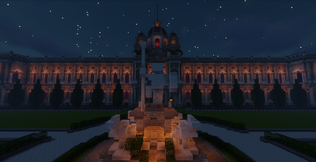
The Palais du Basilinna, Vintner Court, at night
The Vintner Court is the greatest city in Dorwinion, and the most populous - it has long been known as the heart of civilisation in the east. Architectural styles from all over the realm are tried there, and the many salons and parlors of the city have turned it into a hub of ideas. In recent years, the Vintner Court serves as the control centre for the Directorate - a council of nobles dedicated to the preservation of Dorwinine law and order in these leaderless times. However, the glamorous and ever-rising star that is the Vintner Court hides a darker side to it all - while the Mitropolit gains great prestige and monetary gain from their commerce and powerful agricultural sector, the territories outside Metropolitan Dorwinion have begun to decay in the absence of a formal ruler, and many have decided to throw off the yoke of taxation altogether, leaving the Directorate's control over the provinces tenuous at best...
GWINOPOLIS
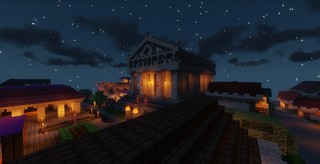
The city of Gwinopolis.
The city of Gwinopolis is a major city in the Mitropolit, and the second-largest in Dorwinion. As a wealthy and powerful port city, Gwinopolis reserves a unique spot in Dorwinine politics - having outdone Mirulond as the greatest coastal city in the realm(and possibly in the entire inland sea) Gwinopolis has much bargaining power when it comes to dealing with the Directorate. Established by Basil III, the city has a long and separate history from the rest of the Mitropolit - this could even by noted in its staunchly revivalist architecture - and its leaders have come into conflict with the ever-fragile Directorate over policies involving the Mitropolit. Like most other dissident regions, Gwinopolis and the nearby countryside has refused to pay taxes to the Directorate at the Vintner Court, irritating them to no end.
ARENIPOLIS
Dorwinine Păduri(North)[]
THRONIOPOLIS
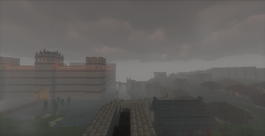
Throniopolis.
The city of Throniopolis lies to the north of Dorwinion, in the area known as the Paduri. Dominated by a large fort of red and white brick, its architecture is a prime example of the Revivalist Style found during the post-Aenlid era, most specifically during the Alexian Restoration; during that time period, Throniopolis served as the first capital of the Alexian Dynasty under Archibados I. As the seat of the Directorate in Paduri, it remains loyal to the Vintner Court.
Dorwinine Marchiză(Arenellia):[]
ARENELLE
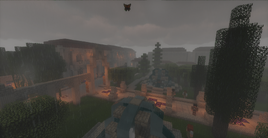
The city of Arenelle.
The largest city in the region known as the Marchiză('The March'), Arenelle is a dominant force in Dorwinine politics. In recent years, the previously sleepy, peaceful city has drastically heightened its military presence in the region and forced the government of the Vintner Court to make concessions, granting the entirety of the Marchiză more autonomy. This has given rise to the Duchy of Arenellia on the frontierlands of Dorwinion controlling much of what used to be the Archonate of Fillias.
CEZARIA
A city within eyesight of nearby Arenelle, Cezaria is a slightly smaller(but no less impressive) city, unwalled but prosperous. Not too much distinguishes this city from its counterparts, but it most notably served as the home for Basileus Cerendir I's household.
DONSDALE GREENS
Donsdale is a neighborhood not long off the city of Arenelle. A small but warm village, the predominantly wooden buildings are simple but somewhat picturesque, giving the hamlet a rather charming aesthetic. The town was annexed into Arenelle in the reign of the Directorate.
Free Exarchates/Hetmanates:[]
ARISH
Arish is a small city on the northern frontier of Dorwinion, situated within the region known as the Arish-Mitropol during the early Hakkonid period. It participates in trade with the Avari to the east and Dale due west across the river, most notably with the cities of Ankorien Poltzen and Bardhaven.
CELENIUM
A small, decaying village straddling the redwater, the elven-dominated settlement of Celenium is a prime example of Dorwinion's decay ever since the death of Basileus Cerendir. With central authority in the Vintner Court fading, the inhabitants of Celenium have chosen to take matters into their own hands and rule as a semi-independent exarchate free from Heartland taxation.
ODESSA
A moderately-sized village on the border of the Dorwinion heartland, it recieves trade on a regular basis and is famed for its significant chalk quarrying industry. Odessa remains a village nowadays, but it is beyond a shadow of a doubt the wealthiest, largest and most powerful of the Exarchates outside Dorwinine metropolitan lands.
ARGOS
A sizeable harbour port on the island of Tol Rhûnaer, Argos is a Hetmanate, or colony, of the Dorwinine realm. Isolated from the rest of Dorwinion by a vast stretch of sea, the people of Argos have known little interference in their affairs - as a result, they are self-sufficient and rule their territory with full autonomy. However, they have not managed to gain any military prowess ever since the days of the Aenlid Dynasty, and their control over the island of Tol Rhunaer has remained nominal at best.
MERAKAI
A hamlet to the south of the Emyn Winion, it straddles the golden ford that separates the land of Rhûn from Dorwinion's imperial possessions; it is mainly known for its river trade and fishing industry. Merakai, like the other far-flung territories of the defunct Aenlid Dynasty, has become a Hetmanate, claiming partial independence from the Directorate.
RAUBASTRU

The village of Raubastru.
Raubastru is a Hetmanate on the far western end of Dorwinion; it houses a temple of Javane and is known for its leather trade, particularly in the hunting, skinning and tanning of aurochs.
ALBASERICA

The village of Albaserica.
Albaserica is a Hetmanate on the bend of the river Langien; it is well-known for its white temple of Javane, which gives it its name.
LARAQUESKY NOVGOROD
A failed colony set up by an old marshal of the Aenlids, the village of Laraquesky Novgorod stands incomplete and fully deserted. It has been overrun by bands of orcs, and as a result no one has attempted to make use of its foundations for greater deeds.
History of Dorwinion in the Third Age[]
Dorwinion was first recorded in the annals of the West in the memoir There and Back Again, by the illustrious hobbit Bilbo Baggins. While its brief reference was somewhat succinct, the land remains shrouded in mystery to those who live far from its borders. Many even from the Shire know of old King Bladorthin and his spears of dwarven-make; their relations with the Woodland Realm are also well known. But of their culture, their customs, their people, the beauty of their land? Dorwinion is a hidden jewel, a unsuspecting oasis of prosperity and joy in the barren lands of Rhun and Rhovanion.
After the First Dorwinine Kingdom under Bladorthin, the texts written in its day disappeared, leaving little trace of its detail nor history. Dorwinion receded into a loose confederation of tribes and lesser peoples. It was only during the Fourth Age that the first Emperor re-united the tribes.
Values[]
- As Dorwinion's people view the nation as a paragon and beacon of civilisation, the values of civilised, refined life are upheld with utmost prejudice. Chivalry, Dignified behaviour and compassion towards others are examples of Dorwinine civilised values.
- Wine is valued as both a domestic and exported product, and as the lifeblood of Dorwinion's economy it is treated with an odd reverence. Wine can be kept in cellars for years, only to be uncorked at wine-festivals where man and elf make merry, at random.
